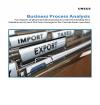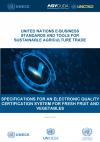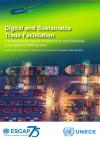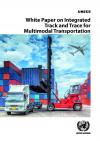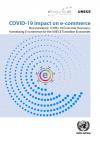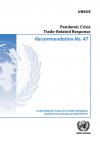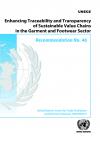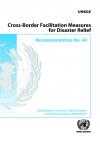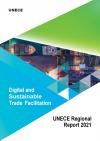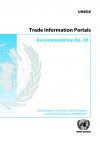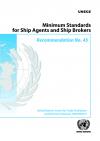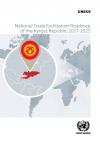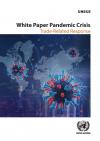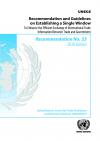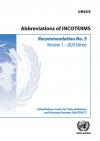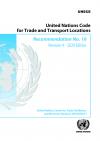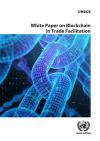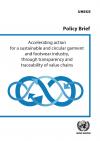Publications
Displaying Results 21 - 40 of 115
- English
The report provides an overview of the general trade and regulatory context of Georgia and an analysis of the key economic figures of the pharmaceutical sector, such as industry composition and dynamics, and exports. It gives an overview of the country’s transport networks and presents key facts of the sector and identifies possible bottlenecks in and proposes solutions for the trade-related
- English
This document presents the eQuality Certification system processes and business requirements for Fresh Fruit and Vegetables covered by marketing standards. It provides a high level functional description of the main business processes to be managed by an electronic Conformity Certificate management system for Fresh Fruit and vegetables . This functional system specification can be used as a
- English
The report presents results of the 2021 United Nations Global Survey on Digital and Sustainable Trade Facilitation for six participants in United Nations Special Programme for the Economies of Central Asia (SPECA), namely Afghanistan, Azerbaijan, Kazakhstan, Kyrgyzstan, Tajikistan and Uzbekistan, reviewing the progress of trade facilitation reforms and provides a detailed analysis based on 58
- English
Transportation demand is forecasted to triple by 2050. Keeping track of that intensification of transportation is imperative for all supply chain stakeholders. Motivated by factors such as operational efficiency standards, competitive pressures, heightened customer expectations and governmental regulations, both public and private organizations are searching for mechanisms to reduce risks by
- English
The COVID-19 pandemic has sunk the global economy into the deepest recession in decades and continues to take an unprecedented toll on human health and life. In an effort to contain and prevent the spread of the disease, governments across the globe, imposed restrictions on movement. Border closures and partial or full lockdowns became the new normal in many parts of the world. The pandemic and
- English
Recommendation 47 outlines measures to mitigate the adverse impact of a pandemic such as COVID-19 on trade flows. Such pandemics have revealed the challenges of facing a health crisis and its impact on society and economies which could potentially leave lasting scars on the global economy.
Download:
- English
Improving traceability and transparency has become a priority for the garment and footwear industry. Consumers, governments, and civil society are demanding responsible business conduct and are calling upon the industry to identify and address actual and potential negative impacts in the areas of human rights, the environment, and human health.
By creating enhanced visibility in value chains,
- English
This high-level policy recommendation advocates to governments the importance of building national capacity and capability to cope with a large influx of humanitarian relief. The sudden onset of a disaster often results in relief providers and national administrations being unclear about importation requirements and procedures for needed relief items. These items may include lifesaving relief
- English
The UNECE Regional Report 2021 on Digital and Sustainable Trade Facilitation has been produced based on the results of the United Nations Global Survey on Digital and Sustainable Trade Facilitation. The Global Survey (ECE/TRADE/467) is a joint initiative under the Joint United Nations Regional Commissions’ Approach,
- English
Transparency and predictability are essential elements for the cross-border movement of goods. In order to trade internationally efficiently and cost effectively, it is necessary to access all the regulatory requirements prior to the actual sale of merchandise. Having an official, single portal where all this information can be accessed provides the necessary transparency and predictability. Such
- English
This UN/CEFACT Recommendation 45 on Minimum Standards for Ship Agents and Ship Brokers (ECE/TRADE/462) is an update of the 1988 UNCTAD minimum standards for ship agents and a reflection of the changes in operational practices in the ship agency profession. It also recognizes, for the first time, the role of the ship broker in bringing the ship and cargo together. It aims to reconcile the effects
- English
The National Trade Facilitation Roadmap of the Kyrgyz Republic 2021-2025 serves as the guiding framework for comprehensive national trade facilitation reforms over a five-year period. The Roadmap sets out a strategic vision and respective goals and activities for the Kyrgyz Republic to implement. Through these activities the Kyrgyz Republic can transform its trade facilitation services to
- English
Introduction
In the future, the year 2020 will be remembered for the COVID-19 pandemic and its related consequences. This may lead to a new normal way of working; but in the meantime, such pandemics could lead to major disruptions in trade flows and damage the overall economic health of countries. There are measures which can be put into place to reduce this impact and allow
- Pусский
Во многих странах компании1 , участвующие в международной торговле, должны готовить и представлять в государственные органы большой объем информации и документов для соблюдения нормативных требований, связанных с импортом, экспортом и транзитом. Часто эту информацию и документацию необходимо представлять в несколько различных учреждений, каждое из которых имеет свои собственные специфические (
- Français
Dans beaucoup de pays, les entreprises1 qui font du commerce international doivent réunir un très grand nombre d’informations et de documents et les présenter aux autorités publiques afin de satisfaire aux exigences réglementaires en cas d’importation, d’exportation et de transit. Ces informations et documents doivent souvent être soumis à plusieurs administrations différentes, qui ont chacune un
- English
Harmonization and partnership are key elements to ensure interoperability of international standards. The United Nations Economic Commission for Europe (UNECE) has worked with partner organizations to ensure that the guidance we provide on topics like international trade are harmonized with their work. One key success story is the partnership with the International Chamber of Commerce (ICC) which
- English
Work on the United Nations Code for Trade and Transport Locations (UN/LOCODE) was started in 1972 by the United Nations Economic Commission for Europe (UNECE) Working Party on Facilitation of International Trade Procedures, which was the predecessor of the United Nations Centre for Trade Facilitation and Electronic Business (UN/CEFACT). In 1980 the first edition of Recommendation N°16 on UN/
- English
In many countries, companies involved in international trade must prepare and submit large volumes of information and documents to governmental authorities to comply with import, export and transit-related regulatory requirements. Often, this information and documentation must be submitted to several different agencies, each with their own specific (manual or automated) systems and paper forms.
- English
The UN/CEFACT Blockchain White Paper Project oversaw the preparation of two White Papers. The first, which looks at Blockchains’ impact on the technical standards work of UN/CEFACT, has been published (ECE/TRADE/C/CEFACT/2019/8). This is an update of the second White Paper, which looks at how Blockchain
- English
The garment and footwear industry has one of the biggest environmental footprints and poses great risks for human health and society. At the same time, the complexity and opacity of the value chain makes it difficult to identify where such impacts occur and to devise necessary targeted actions. In the next decades, fast fashion trends, coupled with growing demand in emerging economies, are


